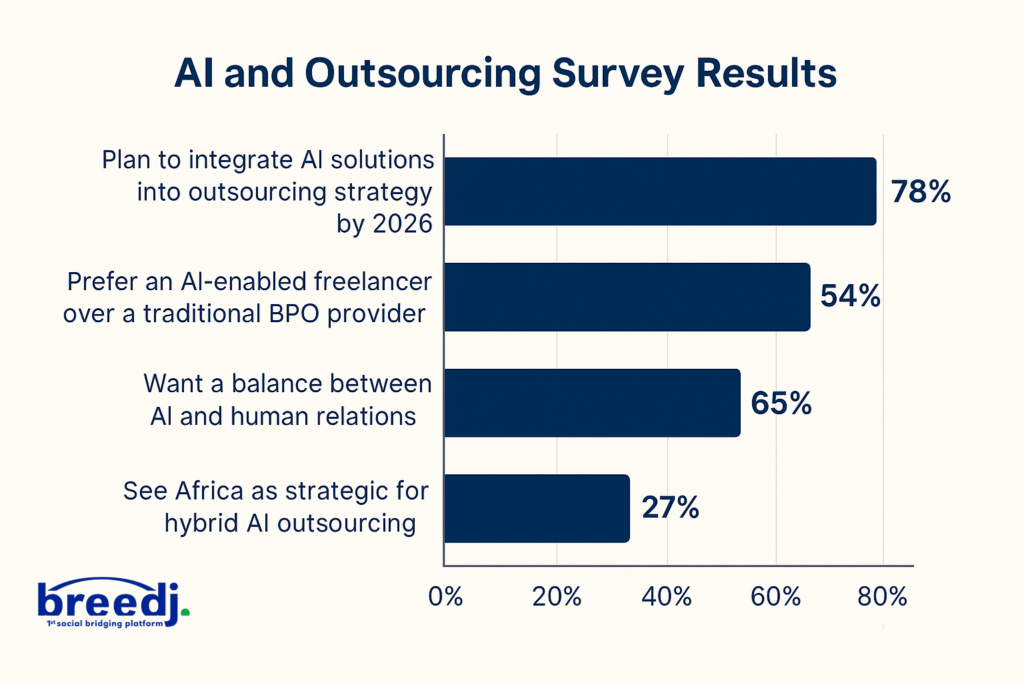How Artificial Intelligence is Transforming Service Outsourcing – Insights from 1,000 HR and Tech Decision-Makers
In March 2025, Breedj.com conducted a survey of 1,000 decision-makers in the fields of human resources, tech, customer relations, financial services, and e-commerce. The goal of this study was to understand how artificial intelligence is reshaping outsourcing practices, whether through freelancers, Employer of Record (EOR) models, or BPO providers.
Respondent Profile:
38% are HR professionals or recruitment experts,
24% are IT managers or directors,
18% are SME executives,
12% work in financial services,
8% come from e-commerce or customer service sectors.
AI is Becoming a Strategic Pillar of Outsourcing
78% of surveyed companies said they plan to integrate one or more AI solutions into their outsourcing strategy by 2026. Automation and process optimization are identified as top priorities.
Most cited use cases:
61%: automation of repetitive tasks (CRM, emails, data entry),
49%: predictive analytics for customer experience or HR,
37%: deployment of chatbots or voice assistants for customer support,
22%: use of generative AI to produce simple content,
15%: automated resume screening and candidate scoring.
The Human Element Remains Essential: 65% Want a Human-AI Balance
When asked, “Can AI fully replace an external service provider?”, 65% of respondents answered no. AI is seen as an assistant, not a complete substitute.
Top concerns expressed:
58%: loss of personalization in customer experience,
45%: risk of undetected errors,
33%: dehumanization of brand image,
27%: poor handling of complex or emotional cases.
Augmented Freelancers vs Traditional BPO: A New Standard
When asked whether they prefer working with an AI-enabled freelancer or a traditional BPO provider, results show a clear preference for the augmented freelancer.
Response breakdown:
54%: freelancer trained in AI tools,
31%: traditional BPO provider,
15%: hybrid model combining freelancer and oversight.
Main motivations:
61%: operational flexibility,
44%: more advanced digital skills,
38%: greater responsiveness for short-term projects,
24%: cost reduction and productivity gains.
Functions Most Affected by Automation
Respondents identified several functions as highly impacted by AI-driven automation.
Top 6 targeted functions:
Level 1 customer support – 69%,
Data entry – 63%,
Resume screening / recruitment – 42%,
Simple content creation (SEO, social media) – 39%,
Basic reporting and accounting – 28%,
Level 1 IT support – 26%.
Functions deemed least automatable:
Premium customer relationship management – 23%,
Custom software development – 21%,
Project management – 19%,
Strategic human resources – 15%.
Africa: The Future Hub of Augmented Outsourcing?
27% of respondents see Africa as a strategic region for developing hybrid AI-powered outsourcing. The most cited countries are Mauritius, Madagascar, Tunisia, Senegal, and Kenya.
Reasons cited include:
A growing, digitally connected youth population,
Competitive production costs,
Rapid growth of AI training programs,
Rising interest in ethical outsourcing models.
Breedj.com is already active in several of these countries, helping local freelancers upskill with automation and AI tools.
Toward an Augmented and Ethical Outsourcing Model
The study reveals that AI has become a key component in modern outsourcing strategies. However, companies are not ready to give up the human element. The future of outsourcing lies in a balanced blend of smart automation and skilled talent.
The augmented freelancer model flexible and tech-equipped is emerging as the preferred alternative to traditional BPO. Meanwhile, Africa is positioning itself as a key player in this new era, driven by connected, trained, and responsible talent.
Breedj.com fully embraces this dynamic by offering a modern, hybrid, and impact-driven outsourcing solution.














